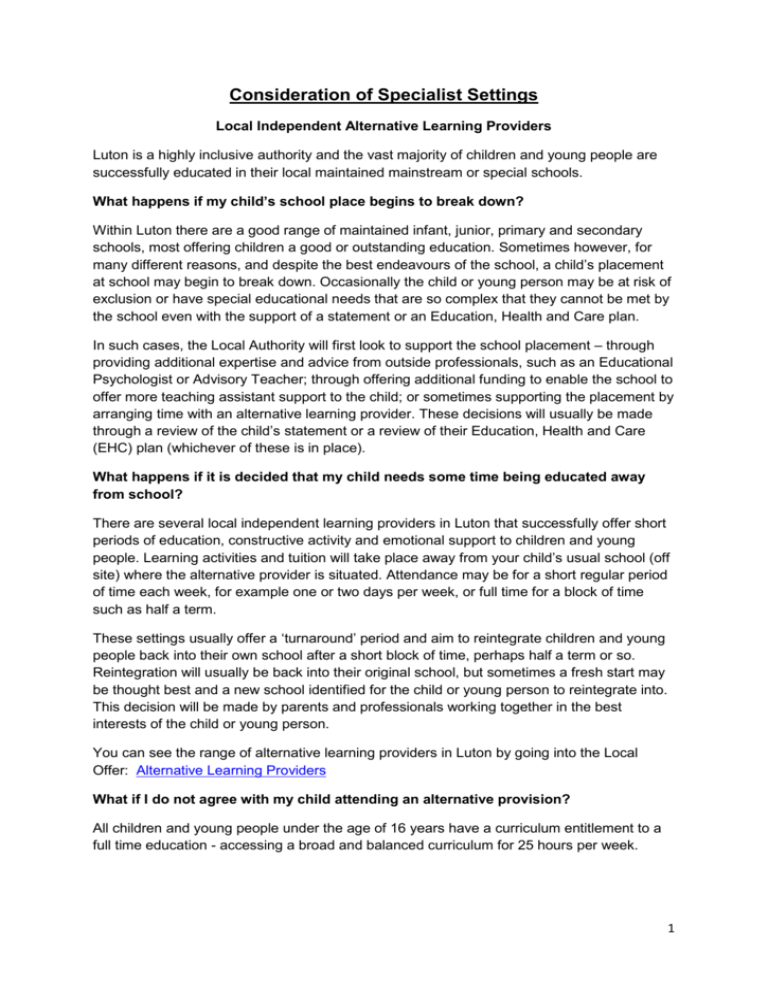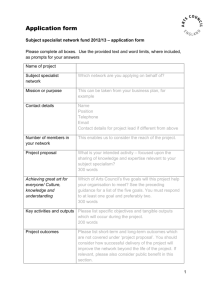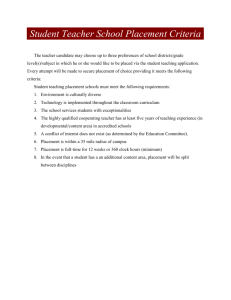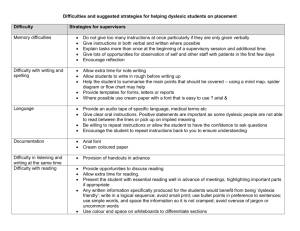Consideration of Specialist Settings Process
advertisement

Consideration of Specialist Settings Local Independent Alternative Learning Providers Luton is a highly inclusive authority and the vast majority of children and young people are successfully educated in their local maintained mainstream or special schools. What happens if my child’s school place begins to break down? Within Luton there are a good range of maintained infant, junior, primary and secondary schools, most offering children a good or outstanding education. Sometimes however, for many different reasons, and despite the best endeavours of the school, a child’s placement at school may begin to break down. Occasionally the child or young person may be at risk of exclusion or have special educational needs that are so complex that they cannot be met by the school even with the support of a statement or an Education, Health and Care plan. In such cases, the Local Authority will first look to support the school placement – through providing additional expertise and advice from outside professionals, such as an Educational Psychologist or Advisory Teacher; through offering additional funding to enable the school to offer more teaching assistant support to the child; or sometimes supporting the placement by arranging time with an alternative learning provider. These decisions will usually be made through a review of the child’s statement or a review of their Education, Health and Care (EHC) plan (whichever of these is in place). What happens if it is decided that my child needs some time being educated away from school? There are several local independent learning providers in Luton that successfully offer short periods of education, constructive activity and emotional support to children and young people. Learning activities and tuition will take place away from your child’s usual school (off site) where the alternative provider is situated. Attendance may be for a short regular period of time each week, for example one or two days per week, or full time for a block of time such as half a term. These settings usually offer a ‘turnaround’ period and aim to reintegrate children and young people back into their own school after a short block of time, perhaps half a term or so. Reintegration will usually be back into their original school, but sometimes a fresh start may be thought best and a new school identified for the child or young person to reintegrate into. This decision will be made by parents and professionals working together in the best interests of the child or young person. You can see the range of alternative learning providers in Luton by going into the Local Offer: Alternative Learning Providers What if I do not agree with my child attending an alternative provision? All children and young people under the age of 16 years have a curriculum entitlement to a full time education - accessing a broad and balanced curriculum for 25 hours per week. 1 If it is decided that your child might benefit from a period of time following a reduced timetable or spending some time being educated off the school site within an alternative provision, then this must be With full parental agreement A supportive strategy (rather than punitive) Time limited With a clear written plan for increasing time in school Maintained Special Schools and Specialist provisions But my child has special educational needs that are too great for their mainstream school to manage..... When a child or young person has special educational needs that are too great for their mainstream school to manage, this will be addressed initially through a review of the child’s statement of special educational needs or through an EHC plan review. The review will focus on whether the child or young person’s needs are described correctly in their statement/EHC plan, whether the outcomes are achievable for that child or young person, whether the appropriate provision has been made to achieve those outcomes and whether the school named in the statement/plan can reasonably be expected to make that provision with the support of the funding allocated to the statement or plan. If not, then a specialist provision or special school will be considered. There are two primary special schools and one secondary special school for children with complex learning difficulties. There are also several specialist provisions sited within mainstream schools offering access to specialist teaching and learning approaches and specialist equipment. These include provisions for children with visual and hearing impairments, physical disabilities and autistic spectrum disorders. Each area also has a specialist provision for primary aged children with social, emotional and behavioural difficulties, managed through the area partnership. Link to Special Schools in Luton on the Local Offer Links to Specialist Provisions in School on the Local Offer School Name Bramingham Primary School Chantry Primary Academy Icknield High School Icknield Primary School Lea Manor High School Putteridge High School Stopsley High School Wigmore Primary School Provision Type Physical Impairment provision Visual Impairment provision Hearing Impaired provision Hearing Impaired provision Social & Communication Difficulties provision Visual Impairment provision Physical Impairment provision Social & Communication Difficulties provision Social & Communication Difficulties provision 2 What happens if my child’s special educational needs cannot be met by the local maintained special schools or specialist provisions? Independent Special Schools In a very few cases, the Local Authority might decide that a child or young person’s special educational needs cannot be met locally within the wide range of local provision available. Sometimes this decision is made solely on educational grounds, because the child’s special educational needs are too great to be met in a local maintained mainstream or maintained special school. In other circumstances, there will be a multiagency decision around placement that also takes into account whether the child or young person’s health or social care needs can be met locally. In these cases the placement might be funded from a pooled budget. The decision around whether to place a young person outside of the local area is made at Luton Borough Council’s External Resources Panel for Children and Young People (ERCYP), a multi-agency decision making panel. When an independent special school is agreed on educational grounds alone, we will try to keep the child or young person as close to home as possible. The Assessment Officer (Special Educational Needs Assessment Team) will look for independent specialist placements where possible in the following order of priority An independent day school within reasonable travelling distance (around 1 hour) A residential school offering weekly boarding within a reasonable travelling distance (around 2 hours) A residential school offering termly boarding (38 weeks) In exceptional circumstances, a 52 week residential placement (most commonly when a child or young person is in care to the Local Authority) Parents are entitled to make representations to the Local Authority in order to request placement in an independent special school. The Local Authority has to consider the parental request but is not under a duty to agree the request if the school is unable to meet the child’s special educational needs or if the proposed placement would be incompatible with the efficient education of the other children learning there, or if there is a local alternative which means that the placement proposed by parents would be considered by the Local Authority to be an unreasonable public expense. The Secretary of State has published a list of approved independent special institutions (Independent Special Schools – England and Wales and Special Post-16 institutions). Institutions on the approved list are published on GOV.uk at https://www.gov.uk/government/publications/section-41-secretary-of-state-approved-list 3









